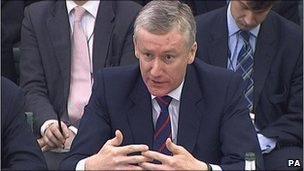Bankers and unanswerable questions
- Published
- comments
Lord Stoneham reveals details of Mr Goodwin's injunction
This is what the Liberal Democrat peer, Lord Stoneham of Droxford, said in the House of Lords today:
"Every taxpayer has a direct public interest in the events leading up to the collapse of the Royal Bank of Scotland, so how can it be right for a super-injunction to hide the alleged relationship between Sir Fred Goodwin and a senior colleague?
"If true, it would be a serious breach of corporate governance and not even the Financial Services Authority would be allowed to know about it."
Now because an injunction has been taken out there is not much I can say about all this.
The uncontentious facts are that Sir Fred Goodwin was chief executive of Royal Bank of Scotland at the time the bank had to be bailed out by taxpayers in the autumn of 2008. And he is widely blamed for encouraging and allowing RBS to take on excessive risks in the years preceding the bank's collapse.
This is what Royal Bank of Scotland's internal code of conduct says about close relationships between employees of the organisation:
"While the Group entirely respects the right of every one of us to form friendships and personal relationships at work, there will be occasions when it will be appropriate to tell your manager about a relationship that may impact on your work by creating a conflict of interest…
"The onus is on you to identify when it is appropriate to inform your manager of any relationship or association that has the potential to create a conflict of interest.

Sir Fred Goodwin was widely criticised following the crisis at RBS
"It is always better to discuss a potential conflict situation. Sometimes you may feel that you have adequately balanced your relationship with the person with your responsibilities to the Group. You may not be able to see that your judgement has been compromised. Asking your manager to help you make a judgement will assist in ensuring that your position is viewed objectively."
So if Sir Fred had a relationship with a senior colleague, in the way that Lord Stoneham suggests, three questions arise that are in the public interest to be answered:
1) was it in breach of Royal Bank's internal code of conduct in any way;
2) could it have any bearing on decisions about the risks taken on by RBS; and
3) is there anything else about the putative relationship which regulators, shareholders and the banks' non-executive directors should have known about?
Now it may turn out that the answer is no to all or most of these questions in respect of any relationship that may or may not have been formed between Sir Fred and a colleague.
In fact, if I was a betting man (which I'm not) I would wager that if there was an indiscretion, the governance breach and reputational damage to RBS would be rather less than in the case of a number of affairs with staff I know about conducted by chief executives of other companies.
But the Catch 22, as Lord Stoneham implies, is that we can't answer the questions, because of the existence of the injunction.
If you felt that Alice through the looking glass was alive and kicking, you might be right.
Update, 16:45: Mr Justice Tugendhat has this afternoon varied the injunction that made it impossible to name Sir Fred Goodwin in connection with an alleged "sexual relationship".
So it is now permissible to call Sir Fred a "banker".
But the judge kept in place the prohibition on disclosing details of the alleged relationship and the name of the woman said to be involved.